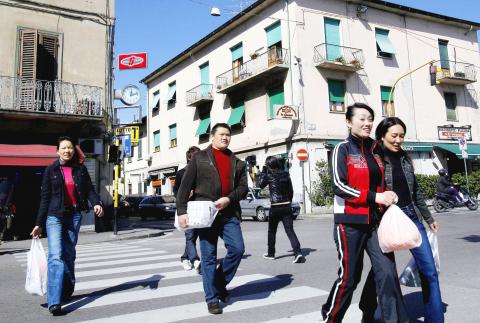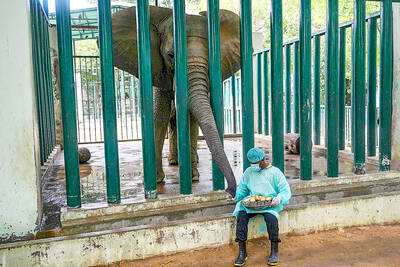Italian police officers sweep through the mosquito-infested clothes workshop, rifling through personal belongings and cracking jokes about the foreign food as six Chinese workers look on in fear.
Boxes filled with sparkling black shrugs and red party dresses spill onto the floor of the warehouse — one of 3,400 small Chinese businesses in Prato in central Italy that produce clothes for companies including Zara and H&M.
“I don’t understand what the problem is, we did everything correctly,” said Giujir, who declined to give her surname because of the police investigation, as she waited by a row of leopard-print dresses for her turn for questioning.

PHOTO: AFP
“There isn’t much work this year because of the crisis, and we have to pay the rent. I know the police have to carry out lots of controls, but it just makes the situation worse,” the worn-out 30-year-old said.
This is the first raid of the week in the historic town of Prato in Tuscany — a place local authorities see as a sort of new Chinese gangland, but immigrants defend as a revitalized hub of Italy’s flagging textile industry.
Chinese immigrants began arriving in Prato some 20 years ago, initially working for Italian companies before setting up their own businesses.
There are now about 17,000 Chinese out of a population of 188,000 — 50,000 if you include the estimated number of undocumented immigrants.
Though Chinese workers are now involved in every stage of production — even the cloth is imported because it costs 10 times less than Italian fabric — the companies can legally sell their clothes with the “Made in Italy” label.
The clothes are sold wholesale — at around 5 euros (US$6.50) for a dress or 10 euros for a coat — and bundled into vans from eastern and northern Europe that come and go seven days a week.
Few Italian shops remain in Prato’s Chinatown, located just next to the town’s historic center. The area is dotted with Chinese restaurants and supermarkets and almost all the signs are written in Chinese.
Prato’s residents last year voted in a new mayor — himself a textile business owner — who promised to tackle the Chinese community’s monopoly of the textile industry and crack down on Chinese--related crime.
Police raids in what Italian media calls “little China” have increased hugely since Mayor Roberto Cenni’s election, including investigations of mafia groups involved in money-laundering, loan-sharking and human trafficking.
The raid on Giujir’s workshop was for a much smaller infraction — workers were living illegally inside the building in unsafe and unsanitary conditions.
According to Silvia Pieraccini, journalist and author of a book on the Chinese textile industry in Prato, the workers live in the warehouses because they work 18 hours a day and sleep where they drop.
“The Chinese work a great deal. They are very quick to understand where the market is going, but they work in deplorable conditions, without contracts and in buildings that are unsafe and often unhygienic” she said.
Forty-seven-year-old Surong Badeng from Xinjiang, a police interpreter, said the Chinese community worked hard through choice not exploitation.
“They come to Italy to make money and have no time to integrate. They are ready to make huge sacrifices to get rich,” he said.
Prato’s mayor insists that the police crackdown to clean up the textile industry is about protecting exploited Chinese.
“We want to get closer to those who are being exploited in the hope that we can persuade them to rebel,” Cenni said.
That is not the way the Chinese embassy sees it.
“It’s wrong of Italy to carry out raids with helicopters and dogs. It’s completely over the top. We’re not at war, this is a civil country,” Tang Youjing, a counselor at the Chinese embassy, said in an interview.

NO EXCUSES: Marcos said his administration was acting on voters’ demands, but an academic said the move was emotionally motivated after a poor midterm showing Philippine President Ferdinand Marcos Jr yesterday sought the resignation of all his Cabinet secretaries, in a move seen as an attempt to reset the political agenda and assert his authority over the second half of his single six-year term. The order came after the president’s allies failed to win a majority of Senate seats contested in the 12 polls on Monday last week, leaving Marcos facing a divided political and legislative landscape that could thwart his attempts to have an ally succeed him in 2028. “He’s talking to the people, trying to salvage whatever political capital he has left. I think it’s

Polish presidential candidates offered different visions of Poland and its relations with Ukraine in a televised debate ahead of next week’s run-off, which remains on a knife-edge. During a head-to-head debate lasting two hours, centrist Warsaw Mayor Rafal Trzaskowski, from Polish Prime Minister Donald Tusk’s governing pro-European coalition, faced the Eurosceptic historian Karol Nawrocki, backed by the right-wing populist Law and Justice party (PiS). The two candidates, who qualified for the second round after coming in the top two places in the first vote on Sunday last week, clashed over Poland’s relations with Ukraine, EU policy and the track records of their

UNSCHEDULED VISIT: ‘It’s a very bulky new neighbor, but it will soon go away,’ said Johan Helberg of the 135m container ship that run aground near his house A man in Norway awoke early on Thursday to discover a huge container ship had run aground a stone’s throw from his fjord-side house — and he had slept through the commotion. For an as-yet unknown reason, the 135m NCL Salten sailed up onto shore just meters from Johan Helberg’s house in a fjord near Trondheim in central Norway. Helberg only discovered the unexpected visitor when a panicked neighbor who had rung his doorbell repeatedly to no avail gave up and called him on the phone. “The doorbell rang at a time of day when I don’t like to open,” Helberg told television

A team of doctors and vets in Pakistan has developed a novel treatment for a pair of elephants with tuberculosis (TB) that involves feeding them at least 400 pills a day. The jumbo effort at the Karachi Safari Park involves administering the tablets — the same as those used to treat TB in humans — hidden inside food ranging from apples and bananas, to Pakistani sweets. The amount of medication is adjusted to account for the weight of the 4,000kg elephants. However, it has taken Madhubala and Malika several weeks to settle into the treatment after spitting out the first few doses they